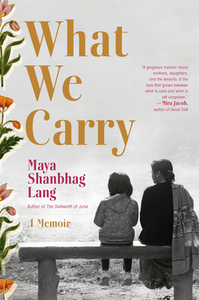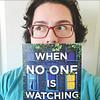Take a photo of a barcode or cover
emotional
hopeful
reflective
sad
medium-paced
“Until we are in the river, up to our shoulders—until we are in that position ourselves, we cannot know the answer. We tell ourselves we will sacrifice ourselves for our children, but the will to live is very strong.”
There was a lot I’ll take with me from this book, about memory, mothers & daughters, the stories we tell, and the ways we think about sacrifice and parenting.
There was a lot I’ll take with me from this book, about memory, mothers & daughters, the stories we tell, and the ways we think about sacrifice and parenting.
challenging
emotional
reflective
sad
slow-paced
Minor: Chronic illness, Eating disorder, Emotional abuse, Mental illness, Self harm, Suicidal thoughts, Terminal illness, Grief, Suicide attempt
This is what a mother’s love looks like to me. It looks like suffering.
There is a story that is referred to a lot Maya Shanbhag Lang’s memoir, What We Carry , it is about a mother crossing a river with her son. The mother realizes that the river is much deeper than expected and she had a choice to make, save herself or save her child in a river with her son… Maya and her Mother works to figure out what the mother in the story choice should be.
What We Carry is writer Maya Shanbhag Lang’s memoir about her relationship with her mother. It is well written, visceral, deeply moving, complicated, beautiful, nuanced and packed with so many different feelings. Maya documents what is like for her taking care of her very independent, brilliant, strong mother who is diagnosed with Alzheimer’s. She must recreate a story in her mind to make the changes in roles easier.
During her care taking Maya finds out more about her Mother’s past, things she wasn’t privy to, “secrets” that rock her to her core. This part for me really hit home, I really identified with Maya’s family, and when she wrote “I grew up with the understanding that the past was off-limits… My whole family avoided the subject. I have no idea how this unspoken pact was formed. I FELT THIS! So imagine having to take care of your mother with Alzheimer’s, who tells you her secret and you have no way of working through those emotions.
This book perfectly captures in a beautiful way, motherhood and mother-daughter relationships. I was blown away but the purity of the relationship and Maya’s commitment to being authentic to her story.
I highly recommend this one.
What I learned reading this book
I learned that pharmaceutical companies often out x and y In the product names (Xanax, Paxil, Zoloft, Prozac) because it makes them more memorable
The French refers to orgasm as la petite mort
There is a story that is referred to a lot Maya Shanbhag Lang’s memoir, What We Carry , it is about a mother crossing a river with her son. The mother realizes that the river is much deeper than expected and she had a choice to make, save herself or save her child in a river with her son… Maya and her Mother works to figure out what the mother in the story choice should be.
What We Carry is writer Maya Shanbhag Lang’s memoir about her relationship with her mother. It is well written, visceral, deeply moving, complicated, beautiful, nuanced and packed with so many different feelings. Maya documents what is like for her taking care of her very independent, brilliant, strong mother who is diagnosed with Alzheimer’s. She must recreate a story in her mind to make the changes in roles easier.
During her care taking Maya finds out more about her Mother’s past, things she wasn’t privy to, “secrets” that rock her to her core. This part for me really hit home, I really identified with Maya’s family, and when she wrote “I grew up with the understanding that the past was off-limits… My whole family avoided the subject. I have no idea how this unspoken pact was formed. I FELT THIS! So imagine having to take care of your mother with Alzheimer’s, who tells you her secret and you have no way of working through those emotions.
This book perfectly captures in a beautiful way, motherhood and mother-daughter relationships. I was blown away but the purity of the relationship and Maya’s commitment to being authentic to her story.
I highly recommend this one.
What I learned reading this book
I learned that pharmaceutical companies often out x and y In the product names (Xanax, Paxil, Zoloft, Prozac) because it makes them more memorable
The French refers to orgasm as la petite mort
emotional
hopeful
informative
reflective
medium-paced
Minor: Child abuse, Domestic abuse, Emotional abuse
emotional
hopeful
informative
inspiring
reflective
sad
medium-paced
What We Carry is a short, beautiful memoir focused on the relationship between Maya and her mother. As a young girl, Maya idolized her mother. In comparison to the abuse she received from her father, Maya's mother was loving, protective, and always a stable force. As Maya faces becoming a mother herself, she is shocked to find her perspective of her mother shifting. This changing viewpoint rocks Maya's foundation and forces her to question many core beliefs.
What We Carry is written in short chapters that flow seamlessly from one to the next, which makes for quick reading. The love Maya feels for her mother is palpable, even as she faces struggles in the relationship. It is moving to see Maya cope with each discovery about her mother and herself as she navigates this new stage of life.
I loved Maya's observations about motherhood. She posits that mothers often lack sufficient support systems, self-sacrifice shouldn't be a given, and raising children can be a time to find more of what makes you whole:
"The whole thing makes me rethink motherhood. At awards ceremonies, someone always tearfully acknowledges their mother. 'She sacrificed everything for me,' the person says, breaking down. I don’t want Zoe going through life thinking that I gave myself up for her. I don’t want guilt to be her inheritance. My assumptions of motherhood have been all wrong. I feared I was supposed to have all the answers. I didn’t know my daughter would help me find them. I worried she would be an obstacle to my dreams, not the reason I went after them. Zoe makes me want to be the best version of myself. That isn’t sacrifice. It’s inspiration..
Maya also shares how difficult it is to ask for help. Her push for self-sufficiency is familiar to me, and I'm sure to many readers. There is an underlying reminder that we should be unapologetic about needing--or even wanting--support. There is also a push to recognize that people doing incredible things may have invisible support behind them; ask how they did it, ask for help, say no when you've had enough.
This book is also deeply sad. It is a close look at depression, postpartum depression, and dementia. So while it is well-composed, fast reading, it is also heavy reading. I couldn't put it down. Highly recommended.
What We Carry is written in short chapters that flow seamlessly from one to the next, which makes for quick reading. The love Maya feels for her mother is palpable, even as she faces struggles in the relationship. It is moving to see Maya cope with each discovery about her mother and herself as she navigates this new stage of life.
I loved Maya's observations about motherhood. She posits that mothers often lack sufficient support systems, self-sacrifice shouldn't be a given, and raising children can be a time to find more of what makes you whole:
"The whole thing makes me rethink motherhood. At awards ceremonies, someone always tearfully acknowledges their mother. 'She sacrificed everything for me,' the person says, breaking down. I don’t want Zoe going through life thinking that I gave myself up for her. I don’t want guilt to be her inheritance. My assumptions of motherhood have been all wrong. I feared I was supposed to have all the answers. I didn’t know my daughter would help me find them. I worried she would be an obstacle to my dreams, not the reason I went after them. Zoe makes me want to be the best version of myself. That isn’t sacrifice. It’s inspiration..
Maya also shares how difficult it is to ask for help. Her push for self-sufficiency is familiar to me, and I'm sure to many readers. There is an underlying reminder that we should be unapologetic about needing--or even wanting--support. There is also a push to recognize that people doing incredible things may have invisible support behind them; ask how they did it, ask for help, say no when you've had enough.
This book is also deeply sad. It is a close look at depression, postpartum depression, and dementia. So while it is well-composed, fast reading, it is also heavy reading. I couldn't put it down. Highly recommended.
I really could not relate to this memoir much personally, but I empathize with the writer and her mother, and I love stories about family relationships, even if they don't echo mine.
• r e c o m m e n d a t i o n •
.
"Maybe at our most maternal, we aren’t mothers at all. We’re daughters, reaching back in time for the mothers we wish we’d had and then finding ourselves." - Maya Shanbhag Lang.
.
Perhaps because of the close bond that I share with my mother or maybe because I enjoy reading about relationships that carry a certain amount of intimacy to them, What We Carry moved me immensely. Not often does one come across a memoir that speaks of both, glory as well as shortfalls of mothers. Little did I know that after I'd finish reading the last page, I'll fall short of words to comprehend the enormity of this memoir's impact on me. If there's one book you're trying to squeeze in this year, please add What We Carry to your list. This book has my whole heart.
.
Maya Lang always thought of her mother as a powerful, independent and fierce woman who moved to the States and raised the family single-handedly. After the divorce, her mother worked multiple jobs to keep the family afloat and Maya grows up in awe of her mother's strength. This strong image of her mother wavers when Maya becomes pregnant. While dealing with postpartum and depression, Maya begins to analyse her relationship with her mother without the rose tinted glasses. When asked for help, her mother simply refuses to assist her and this leaves Maya flabbergasted. A woman who drove hours to make sure her daughter was comfortable in the University, outrightly denies to help her during the pregnancy. Maya cannot understand this side of her mother. But when the mother is diagnosed with Alzheimer's, things fall into place.
.
There's a significant shift that occurs when Maya begins to recall her childhood spent with a practical mother and an abusive father. As she dissects the relationship that she shared with her mother, she comes to think of her as a person. Not as a mother. When Alzheimer's robs Maya of her mother's love, she focuses on understanding her mother's life better. As she works through her mother's illness, she feels the bond with her daughter Zoe grow stronger. As the mother-daughter duo speak candidly about various events that spanned across their lives, they pull back and examine several layers that formed their intricate and complicated relationship. Her mother's vulnerability paired with strength reminded me of my own mother. Maya has a gift to connect with the readers and this memoir felt relatable in more than one aspect. I felt her pain, her joy, her need to seek her mother's approval and the constant effort to match up to her mother's level of service. It all felt personal. Mother-daughter relationships are both easy and at times complicated, and What We Carry projects all of this beautifully. Maya is a powerful writer, saying things that were lodged in my head but never made it onto a piece of paper. Everything about this memoir struck a chord with me and even as I write this review, I know very well that I'll go back to this book time and again to seek comfort and warmth. I highly recommend this.
.
Rating : 5/5.
.
"Maybe at our most maternal, we aren’t mothers at all. We’re daughters, reaching back in time for the mothers we wish we’d had and then finding ourselves." - Maya Shanbhag Lang.
.
Perhaps because of the close bond that I share with my mother or maybe because I enjoy reading about relationships that carry a certain amount of intimacy to them, What We Carry moved me immensely. Not often does one come across a memoir that speaks of both, glory as well as shortfalls of mothers. Little did I know that after I'd finish reading the last page, I'll fall short of words to comprehend the enormity of this memoir's impact on me. If there's one book you're trying to squeeze in this year, please add What We Carry to your list. This book has my whole heart.
.
Maya Lang always thought of her mother as a powerful, independent and fierce woman who moved to the States and raised the family single-handedly. After the divorce, her mother worked multiple jobs to keep the family afloat and Maya grows up in awe of her mother's strength. This strong image of her mother wavers when Maya becomes pregnant. While dealing with postpartum and depression, Maya begins to analyse her relationship with her mother without the rose tinted glasses. When asked for help, her mother simply refuses to assist her and this leaves Maya flabbergasted. A woman who drove hours to make sure her daughter was comfortable in the University, outrightly denies to help her during the pregnancy. Maya cannot understand this side of her mother. But when the mother is diagnosed with Alzheimer's, things fall into place.
.
There's a significant shift that occurs when Maya begins to recall her childhood spent with a practical mother and an abusive father. As she dissects the relationship that she shared with her mother, she comes to think of her as a person. Not as a mother. When Alzheimer's robs Maya of her mother's love, she focuses on understanding her mother's life better. As she works through her mother's illness, she feels the bond with her daughter Zoe grow stronger. As the mother-daughter duo speak candidly about various events that spanned across their lives, they pull back and examine several layers that formed their intricate and complicated relationship. Her mother's vulnerability paired with strength reminded me of my own mother. Maya has a gift to connect with the readers and this memoir felt relatable in more than one aspect. I felt her pain, her joy, her need to seek her mother's approval and the constant effort to match up to her mother's level of service. It all felt personal. Mother-daughter relationships are both easy and at times complicated, and What We Carry projects all of this beautifully. Maya is a powerful writer, saying things that were lodged in my head but never made it onto a piece of paper. Everything about this memoir struck a chord with me and even as I write this review, I know very well that I'll go back to this book time and again to seek comfort and warmth. I highly recommend this.
.
Rating : 5/5.
Maya Lang’s memoir, WHAT WE CARRY is the mother daughter story we all need to read. Beyond being a story of Lang and her mother, we see a family dealing with Alzeihmers and it’s realities. A daughter sees her strong, independent and reliable mother turn into a shadow of her former self. Lang longs for what is being lost, and comes to face the fact that the person she once knew may never return.
The memoir is a vulnerable, honest and heartbreaking one. It made me think about my own mom. It made me think about all those patients and families dealing with Alzeihmers. It made me appreciate things. It is a book that will tug on your heartstrings and make you value memory, time and maintenance of self.
I am not the biggest fan of memoirs, but I thoroughly enjoyed Lang sharing her and her mom’s story with the world. Lang highlights the struggle of being a woman, a daughter, a mother and the pressures and expectations that come with it. Lang’s mother is a strong, immigrant woman who made strides for herself and her daughter in the USA as a physician. Using this template and her own life, Lang chronicles the sacrifices and choices she and her mom had/have to make to be good mothers. Unknowingly, Lang’s mother has already armed her for motherhood even before her Alzeihmers starts to overwhelm her. But Lang concludes that “Maybe at our most maternal, we aren’t mothers at all. We’re daughters, reaching back in time for the mothers we wish we’d had and then finding ourselves.”
Another topic dealt with quite well here is that of post partum depression. It is the starting point of Lang’s overt need to be saved by her mother but it ends up being the event in her life that unmasks the fact that her mother can no longer save her, as she herself is slipping away.
Lang has given us the privilege of reading a love letter to her mother. That is essentially what this is. Lang shows us her struggles to swim to shore and the relief in finding some sort of respite there. There is nothing groundbreaking here but in beautiful prose and simple recollections you will definitely find something of value. Add it to your TBR.
The memoir is a vulnerable, honest and heartbreaking one. It made me think about my own mom. It made me think about all those patients and families dealing with Alzeihmers. It made me appreciate things. It is a book that will tug on your heartstrings and make you value memory, time and maintenance of self.
I am not the biggest fan of memoirs, but I thoroughly enjoyed Lang sharing her and her mom’s story with the world. Lang highlights the struggle of being a woman, a daughter, a mother and the pressures and expectations that come with it. Lang’s mother is a strong, immigrant woman who made strides for herself and her daughter in the USA as a physician. Using this template and her own life, Lang chronicles the sacrifices and choices she and her mom had/have to make to be good mothers. Unknowingly, Lang’s mother has already armed her for motherhood even before her Alzeihmers starts to overwhelm her. But Lang concludes that “Maybe at our most maternal, we aren’t mothers at all. We’re daughters, reaching back in time for the mothers we wish we’d had and then finding ourselves.”
Another topic dealt with quite well here is that of post partum depression. It is the starting point of Lang’s overt need to be saved by her mother but it ends up being the event in her life that unmasks the fact that her mother can no longer save her, as she herself is slipping away.
Lang has given us the privilege of reading a love letter to her mother. That is essentially what this is. Lang shows us her struggles to swim to shore and the relief in finding some sort of respite there. There is nothing groundbreaking here but in beautiful prose and simple recollections you will definitely find something of value. Add it to your TBR.
One of the things I love about memoirs is how I automatically hone in on how my personal experiences relate to the author. I suppose that’s true of ALL books, but memoirs are special in this way. There was SO MUCH I could relate to in What We Carry - mostly about our relationships with, and expectations, of our mothers and as mothers. What are the stories we tell each other? Tell ourselves?
It was heartbreaking, affirming, and really a book that can be helpful during this sh*tshow of a world we live in - there is much to chew on about how the unexpected or unasked for can make us stronger, more the person we’re meant to be.
I could also strongly identify with her fitness routine being that time to connect with herself, time not spent taking care of others. I, too, tend to push myself, and it’s a good reminder that health is more important than fitness and I need to care for my body for the long haul.
For more reviews and bookish musings visit http://www.bornandreadinchicago.com/
It was heartbreaking, affirming, and really a book that can be helpful during this sh*tshow of a world we live in - there is much to chew on about how the unexpected or unasked for can make us stronger, more the person we’re meant to be.
I could also strongly identify with her fitness routine being that time to connect with herself, time not spent taking care of others. I, too, tend to push myself, and it’s a good reminder that health is more important than fitness and I need to care for my body for the long haul.
For more reviews and bookish musings visit http://www.bornandreadinchicago.com/







